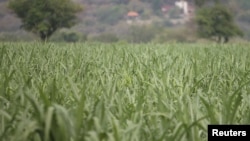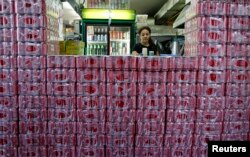Food and beverage companies face the risk of forced labor in countries where they obtain sugarcane but most fall short in efforts to tackle the problem that threatens millions of workers, according to a study released on Tuesday.
Most of 10 companies studied offered only limited details of how they assess and monitor risks of forced labor in specific countries, and most of grievance procedures for workers are weak, said KnowTheChain (KTC), a partnership founded by U.S.-based Humanity United.
Sugarcane, a major agricultural commodity, can be found in a list of household foods and beverages from cereals to sauces and is often harvested by rural migrant workers with machetes who work long hours for low wages in hazardous conditions.
KTC said there is often little law enforcement and those workers are vulnerable to becoming victims of forced labor, especially by recruiters who deceive them about work and wages in other regions or countries.
"It is possible that the sugar in the cereal you ate for breakfast or the soda you drank at lunch was produced with forced labor," said Kilian Moote, KnowTheChain project director, in a statement.
"Agricultural workers, particularly migrants, are at most risk of abuse."
Sugarcane produced by forced labor has been found in Bolivia, Brazil, the Dominican Republic, Myanmar and Pakistan, according to a list published in 2016 by the U.S. government.
Risk Assessment?
Verite, a KTC partner, also found reports of debt bondage of sugarcane workers in India and found sugarcane workers in Guatemala at a high risk of trafficking.
Globally, about 21 million people are victims of forced labor, made to work for free after falling into debt or forced to work due to deception, coercion or threat of violence, according to the International Labor Organization (ILO).
In Brazil, the world's largest producer of sugarcane, roughly a half million people work cutting the crop, according to industry statistics.
The companies studied were Coca-Cola, Fomento Economico Mexicano S.A.B (FEMSA), Monster Beverage, PepsiCo, The Hershey Co., Mondelēz International, Nestlé, Archer Daniels Midland, Associated British Foods (ABF) and Wilmar International.
PepsiCo, Coca-Cola, Nestlé and ABF were the only four companies to undertake forced labor risk assessments of sugarcane supply chains in specific countries, the study said.
Coca-Cola has committed to conduct 28 country-level studies on child labor, forced labor, and land rights for its sugar supply chains by 2020, it said.
Most companies were lacking in revealing details of their risk assessment, monitoring and grievance procedures, it said.
"Few companies disclose information explaining how they address forced labor risks in specific countries, and, where they do, the information is typically focused on understanding and assessing risks, with limited information on concrete follow-up steps," the researchers said.
Asked for a response, a Coca-Cola spokesman said the company provided detailed information to KTC.
"We believe the report speaks for itself," a spokesman said, citing Coca-Cola's policies on human and workplace rights posted on its website.
Contacted by email, none of other nine companies responded immediately to requests for comment.
The study compared policies and practices and used a questionnaire, to which eight of the 10 companies responded. ADM supplied only limited answers and Monster Beverage, a U.S. maker of energy drinks, did not respond, it said.
Coco-Cola, PepsiCo, and Nestlé listed the countries they sourced from most, while Hershey, Mondelēz and Monster Beverage disclosed just one of their sugarcane-sourcing countries, it said.
ADM and Monster Beverage disclosed nothing about if or how they monitor working conditions in their sugarcane supply chains, it said.






